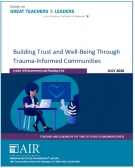Building Trust and Well-Being Through Trauma-Informed Communities: Leader Self-Assessment and Planning Tool
 Educators are increasingly aware of the high rates of student exposure to childhood adversity and trauma and the effects on learning. Adverse experiences include family violence; abuse; parent separation or divorce; family mental health and substance use problems or incarceration; and environmental adversities, such as exposure to group and/or community violence, poverty and related stressors, bullying, racism and discrimination, poor health, and involvement with other systems such as child welfare and juvenile justice. School staff may also be directly exposed to a wide range of adverse and potentially traumatic experiences, and they are at risk of experiencing secondary trauma after witnessing the effects of trauma on their students. Experiences related to the COVID-19 crisis add an additional layer of stressors for students, families, and school staff.
Educators are increasingly aware of the high rates of student exposure to childhood adversity and trauma and the effects on learning. Adverse experiences include family violence; abuse; parent separation or divorce; family mental health and substance use problems or incarceration; and environmental adversities, such as exposure to group and/or community violence, poverty and related stressors, bullying, racism and discrimination, poor health, and involvement with other systems such as child welfare and juvenile justice. School staff may also be directly exposed to a wide range of adverse and potentially traumatic experiences, and they are at risk of experiencing secondary trauma after witnessing the effects of trauma on their students. Experiences related to the COVID-19 crisis add an additional layer of stressors for students, families, and school staff.
In response to this collective trauma, school leaders face unique challenges and opportunities as they work to reopen schools and create school communities that address the intersection between adversity, well-being, and academic success. This handout offers a self-assessment for school leaders that includes an array of trauma-informed strategies for fostering trust, wellbeing, and resilience for all in the learning environment during these unprecedented times.
Note: The parallel supporting student resilience self-assessment and planning tool for teachers includes classroom strategies for supporting student well-being, and staff can use the educator self-care self-assessment to monitor their own well-being practices.

